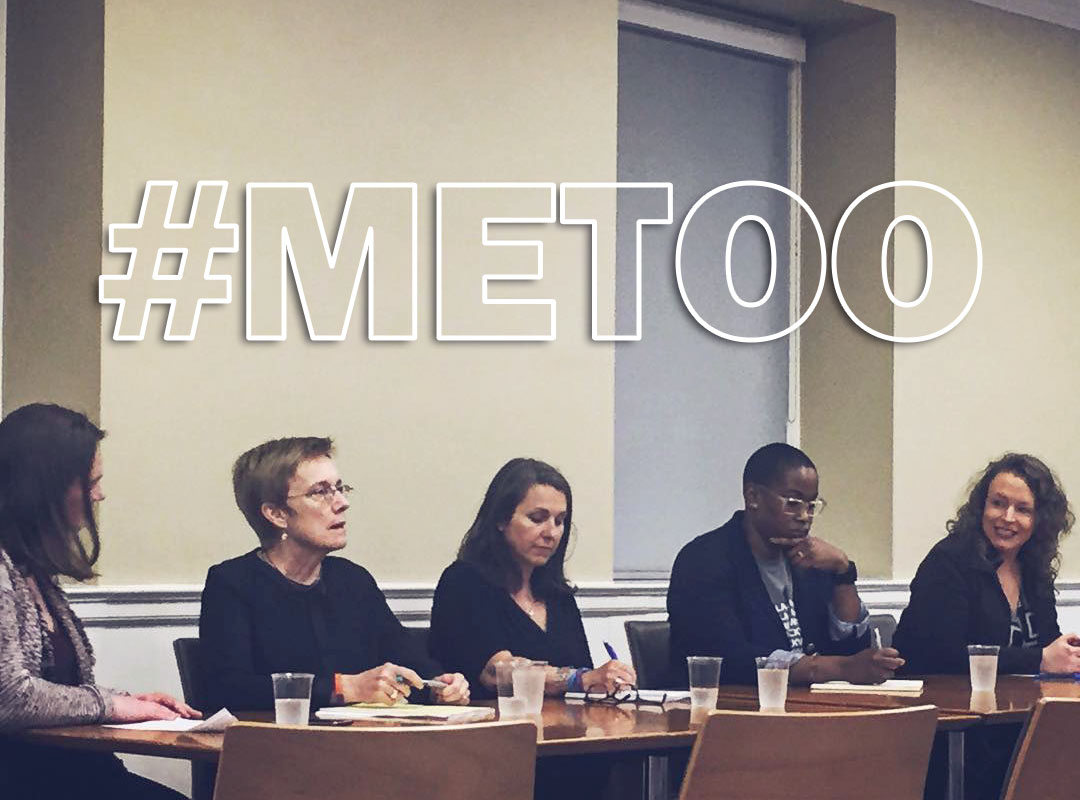
A student recently came to Anne Coughlin with a question.
He was struggling to come to terms with a sexual harassment allegation that had been leveled against his grandfather over something that happened decades ago. His grandfather was a distinguished lawyer and public servant who was now in his 80’s. The student was heartbroken.
How should he think about his grandfather whom he admired so much in light of the allegation?
Coughlin, a law professor, also recalled being approached early in her teaching career by a student who reported that one of her professors kept showing up at her house with a bottle of wine and the assurance his wife was out of town. It was making her extremely uncomfortable, and she did not know how to handle it.
Coughlin shared these stories as one of four panelists who were gathered recently by the Women’s Center to talk about the complicated and personal issues that have been pushed into the limelight on college campuses with the rise of #MeToo.
The rest of the panel was comprised of Assistant Professor of Media Studies, Meredith Clark, Assistant Professor of Women, Gender, and Sexuality, Lisa Speidel, and Catherine Spear, who is the Associate Vice President at the University’s Office for Equal Opportunity and Civil Rights (EOCR).
Together, these women tried to sift through the issues and make sense of #MeToo.
“There are certainly things that happened 20 or 30 years ago that were wrong then, and they’re wrong now,” Coughlin said. “How is it that you can work across generations with a faculty member who is doing stuff that they believed was appropriate at the time and we know that it isn’t? That’s something that I’ve faced for my entire career.”
The legacy of good people doing bad things is something we have to learn to deal with. Clark said a social norm of bad behavior had been enabled even though it was wrong. People in positions of authority stood on societal structures that reinforced their behavior, which kept others from holding them accountable for their actions.
“I think this university in and of itself — like the founder of this University, our hallowed TJ, we have to complicate that history,” Clark said. “If we move from there to that contemporary moment, yes, we’re going to have grandfathers and we’re going to have coworkers … We have to learn how to reconcile ourselves to, ‘This is great person, and I love all of these things that they do, but this thing cannot stand.’”
The key for dealing with those people and allegations? Clark suggested love and accountability.
“They have to be accountable. It’s okay to continue to love them, but to also hold them accountable. Love and accountability go hand in hand that way,” Clark said. “Accountability has no expiration date.”
Clark also noted that, even though it feels like things are moving rather quickly, there are disempowered people — mainly women of color — who have been waiting for this for a long time.
Making the Conversation More Inclusive
On the flipside, Speidel spent some time discussing how issues of sexual assault and harassment affect men and how that relates to #MeToo as well.
“There are a lot of male trauma survivors walking around who aren’t accessing services or talking about it because it’s not masculine to do that,” Speidel said. “It’s estimated that around 1 in 6 boys are sexually abused before the age of 18 even though there are theorists who argue it might be closer to what girls are experiencing — it’s closer to maybe 1 in 4, but we won’t know because they’re so silenced and not able to access services.”
Towards the end of the discussion, the panel took questions from the audience, which was composed of mostly students. For the closing question, fourth-year Dan Tschinkel asked what the next steps for #MeToo should be.
“How could #MeToo change from a moment to a movement?” he asked.
In response, Clark said there needs to be a redistribution of power alongside reparations for the harm that has been done.
“How can we now move around the people who were systematically disempowered and those whom we used gender based violence against to keep them in that position?” Clark asked. “How do we now move them into a position that elevates them — that lets them get into the spaces and work the way that they deserve to work? We owe it to them. That’s where the movement needs to go next.”
Coughlin said that in her field much of the work has been and continues to be to shift legal norms away from the masculine assumptions they have been based on so that they are more inclusive of women. Spear noted that the University has been making changes to focus on not just the student experience but also the experiences of faculty and staff as well.
“We’ve just upgraded the Just Report it online reporting system,” Spear said. “That’s the front public facing, but behind the scenes UVA has put a lot of resources into creating a new centralized database management system that not only tracks Title IX incidents but racial incidents, disability incidents — anything that’s going to fall under the Notice of Non-Discrimination and Equal Opportunity for both students or faculty and staff.” She noted that, in training a large group like UVA's faculty and staff to watch out for and help address discrimination, discussing a broad range of examples helps men understand that the university sees them as potential targets of discrimination and allies to those who experience discrimination. She pointed out that men's participation in the conversation is inhibited when the topic is limited to sexual violence and sexual harassment, as they assume they are being addressed primarily as potential perpetrators.
When Speidel answered the question, she spoke from her perspective as someone who’s been involved in the movement to prevent and respond appropriately to sexual assault for 25 years. She sees #MeToo as one component among other components such as #TimesUp, activism on Grounds, peer educators, One in Four, One Less and the Men’s Leadership Project.
“I’ve seen movements come and go over 25 years,” Speidel said. “What I haven’t ever seen is mass firing of people in power in these sort of elite spaces.”
But Speidel noted that although #MeToo is “incredibly powerful and moving,” one area where we have yet to see as much attention in is the “everyday world” such as the service and hospitality sectors in which many employees face assault or harassment at work.
“I look at it as a great source of raising awareness and breaking silence,” Speidel said. “I don’t feel like it’s the end all be all. It’s one component of a very long movement and a movement that keeps growing and it’s important to ... look at that history. It would be nice for it to not just be a moment.”
Keep the Conversation Going
Even with the expertise offered by these panelists, the issues raised by #MeToo are far too many and too complex to be fully considered at a single event. We receommend that everyone follow the lead of our Women's Center students and staff as well as students in Media Studies, WGS, Law and other disciplines, who are continuing to engage in thoughful discussion with the help of the above experts and others. We invite you to use these links to get a glimpse of these ongoing conversations:
- Cville-ity, November 2017 post by Lisa Speidel
- PALKO POV: Strength in Family Ties, February 2018 post by Abby Palko
- What’s Up with Masculinity: Carlos Andrés Gómez Talks about his Struggle to “Man Up”, March 2018 Iris Magazine article by Women's Center intern, Devin Garcia
- Reports and climate survey results published recently by UVA’s Office for Equal Opportunity and Civil Rights
- Women & Power by Mary Beard (a recommendation made by Anne Coughlin that attendees at the above event were excited to receive)
- Reports and climate survey results published recently by UVA’s Office for Equal Opportunity and Civil Rights (Women's Center staff members have regular opportunities to talk with Catherine Spear and others about EOCR's work. EOCR staff members are a great resource for students interested in learning more about the impact that policy and regulations at various levels as well as criminal and civil law have on these issues.)
- CSJ 101: Our Working Assumptions for Creating Brave Spaces by Jess Myers (an accessible introduction to the notion of brave spaces, an alternative to safe spaces that is part of ongoing discussions at the Women's Center as well as being discussed by the above panelists)

